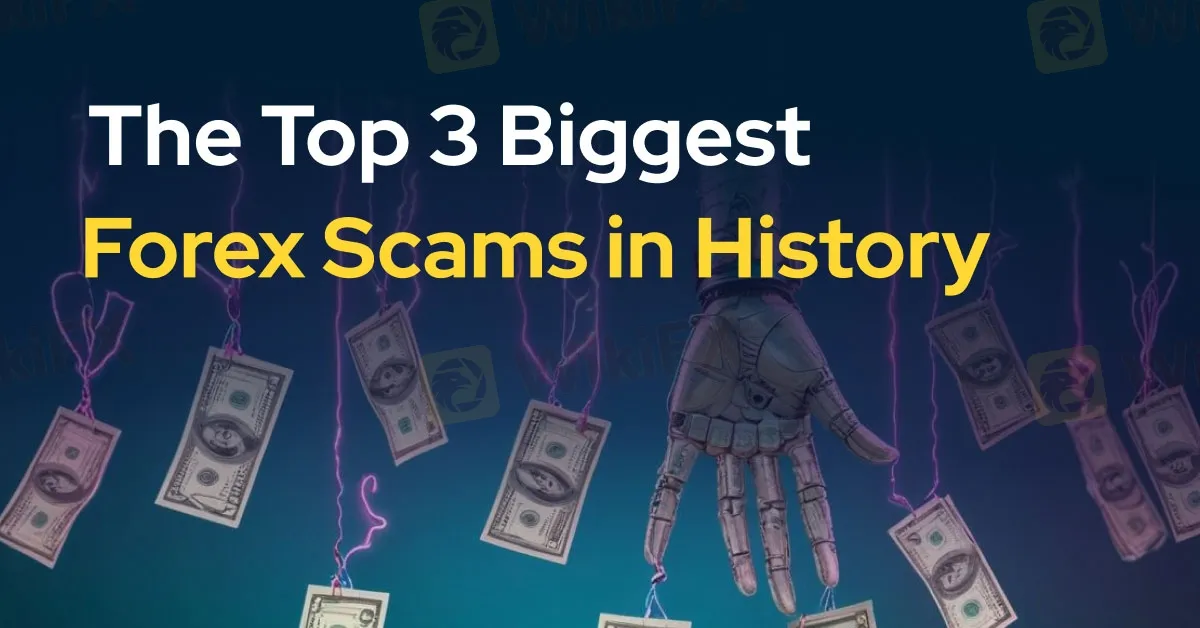简体中文
繁體中文
English
Pусский
日本語
ภาษาไทย
Tiếng Việt
Bahasa Indonesia
Español
हिन्दी
Filippiiniläinen
Français
Deutsch
Português
Türkçe
한국어
العربية
The Top 3 Biggest Forex Scams in History
Abstract:The world of forex trading has seen significant scandals and scams over the years, each with devastating consequences for traders and the financial markets. Here are three of the most notorious forex scams in history.

Forex trading, with its promise of high returns and global accessibility, has long attracted both legitimate traders and unscrupulous scammers. Throughout history, several large-scale forex scams have devastated thousands of investors, stripping them of their savings and eroding trust in the financial markets. Here, we examine the top three biggest forex scams that have ever happened.

In 2017, the U.S. Commodity Futures Trading Commission (CFTC) charged WorldWideMarkets (WWM) and its CEO, Thomas Plaut, along with FXCM Asia and its founder, Dror Niv, with operating a Ponzi scheme that defrauded investors of millions. The scheme involved misappropriating client funds and creating false account statements to cover up the fraud.
WWM and FXCM Asia convinced clients to invest in forex trading accounts with promises of high returns and low risks. Instead of using the funds for legitimate trading, the companies diverted client money to pay off earlier investors in classic Ponzi fashion and for personal use by the executives involved. This scam resulted in significant losses for thousands of investors worldwide and highlighted the vulnerabilities in the forex industry to fraudulent practices.

Alpari UK was once a prominent name in the forex industry, known for its professional standards and large client base. However, the company collapsed spectacularly on January 15, 2015, following the Swiss National Bank's (SNB) unexpected decision to remove the 1.20 EUR/CHF peg. This decision caused the Swiss franc to soar, leading to massive losses for traders who had positions against the franc.
Alpari UK could not cover the negative balances resulting from the market chaos, leading to its insolvency. The firm's downfall left over 100,000 clients, many from outside the UK, scrambling to reclaim their funds. The Financial Services Compensation Scheme (FSCS) ultimately paid out millions in compensation, but the collapse underscored the risks of trading in highly volatile markets and the potential for significant financial instability triggered by sudden policy shifts.

Secure Investments operated one of the largest forex Ponzi schemes in history, defrauding investors out of approximately $1 billion. The scheme promised consistent and high returns through forex trading, drawing in numerous investors. However, instead of trading, Secure Investments used new investors' funds to pay returns to earlier investors, maintaining the illusion of a profitable enterprise.
The scam unravelled in 2014 when the company abruptly shut down its website and ceased all communications with clients. Investors were left with significant losses, and the perpetrators were never apprehended, making it one of the most elusive and damaging forex scams. The Secure Investments case serves as a stark reminder of the importance of due diligence and scepticism when faced with promises of guaranteed high returns in the forex market.
These cases highlight the importance of regulatory oversight and the need for traders to exercise caution when selecting forex brokers. Investors should seek brokers regulated by reputable authorities, conduct thorough research, and remain vigilant to the warning signs of potential scams to protect themselves from financial fraud.

Disclaimer:
The views in this article only represent the author's personal views, and do not constitute investment advice on this platform. This platform does not guarantee the accuracy, completeness and timeliness of the information in the article, and will not be liable for any loss caused by the use of or reliance on the information in the article.
Read more

Forex Candles - What Value Do They Add to Your Trading Experience?
Wondering where you can see the forex price movement information? Easy, it’s all there on forex candles, which demonstrate different market sentiments to help traders make informed decisions. Keep reading to learn more.

Risky Choice? What Traders Should Know About Bold Prime
Risk exists everywhere — even well-known brokers are not exceptions. But they often don’t talk about the risks. Instead, they highlight their strengths and try to attract customers while hiding the potential downsides. However, in this article, you’ll learn about the risks involved with Bold Prime.

Forex vs Stocks - Which Can Generate Maximum Earnings for You?
When looking to build wealth at a faster pace, stocks and forex emerge as two powerful alternatives. But which holds more profit potential? Which of the two is riskier? Find out the answers here.

From Novice to Pro: Why Investors Trust Land Prime?
If you're passionate about forex trading and ready to begin your journey as a trader, this article is worth exploring. It highlights the key features that Land Prime offers to both traders and investors.
WikiFX Broker
Latest News
Top Wall Street analysts are upbeat about these dividend-paying stocks
Singapore's economy grows 4.3% in second quarter, beating expectations
What WikiFX Found When It Looked Into Emar Markets
MT4 vs MT5 Which Forex Trading Platform Fits Your Needs in 2025?
Stock futures slide on more Trump tariff letters, but are off worst levels of session: Live updates
Short or Long Term: Which to Choose for Double-Digit Returns from Gold Investments?
Gold Soars Above $3,350 as XAU/USD Rallies on Trade Tensions
Asia-Pacific markets trade mixed as investors assess Trump's latest tariff threats; bitcoin hits new highs
What is Forex Trading Simulator?
Switzerland tourism boosted as women's soccer continues record-breaking rise
Currency Calculator


